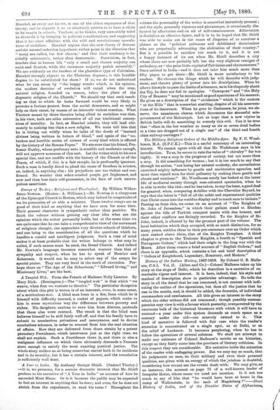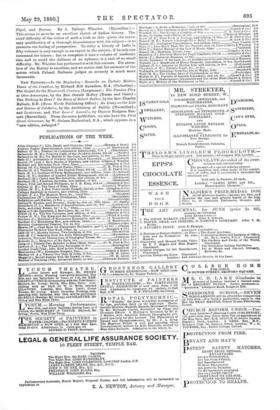History of the Indian Mutiny, 1857-1858. By Colonel G. B.
Malle- son, C.S.I. Vol. II. (Allen and Co.)—Colonel Malleson takes up his story at the siege of Delhi, which he describes iu a narrative of re- markable vigour and interest. It is here, indeed, that his style and method of description show to particular advantage. He tells the story in all the detail that he can command, is not content with indi- cating the outline of the operations, but does all the justice that he can to the merits, and, it should be added, the demerits, of individual commanders and combatants. All this gives an interest to the story which the older writers did not command ; though possibly contem- poraries may view it with a favour which posterity, overpowered by the enormous bulk of the historical literature with which it will have to contend—a year under this system demands as much space as a century under the old—can scarcely extend to it. This kind of narrative is followed with fair ease when the reader's attention is concentrated on a single spot, as at Delhi, or at the relief of Lucknow. It becomes perplexing, when he has to follow the operations of several columns. We shall not attempt to make any estimate of Colonel Malleson's merits as an historian, except as they fairly come into the province of literary criticism. In this respect they are considerable. His narrative holds the attention of the reader with unflagging power. But we may say so much, that his judgments on men, on their military and even their personal qualities, are given with an energy of which the ;wisdom is doubtful, considering how recent are the events dealt with. We may give,.as an instance, the account on page 75 of a well-known leader of Irregular Horse, whose name we need not mention. Is it not too much to say of him that "he would have been at home in the camp of Wallenstein, in the sack of Magdeburg ?"—Short History of India, and of the Frontier States of Afghanistan,
Eipal, and Burma. By J. Talboys Wheeler. (Macmillan.)— This seems to us to be an excellent sketch of Indian history. The chief difficulty of the writer of such a book as this—given the neces- sary qualification of a thorough acquaintance with his subject—is to preserve the feeling of perspective. To write a history of India in fifty volumes is easy enough to an expert in the subject, if he only can command the leisure ; but to compress it into a volume of moderate size, and to avoid the dullness of an epitome, is a task of no small difficulty. Mr. Wheeler has performed it with fair success. His narra- tive of the Mutiny is excellent, and we notice that his estimate of the action which Colonel Malleson judges so severely is much more favourable.



































 Previous page
Previous page